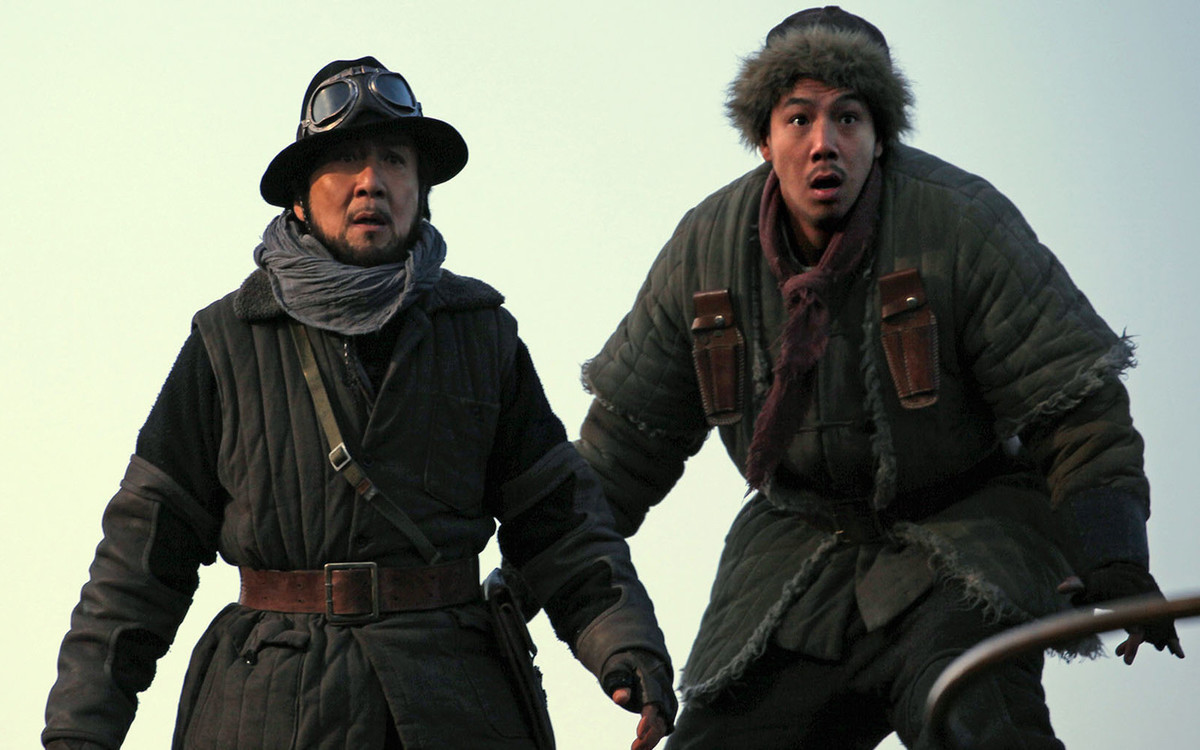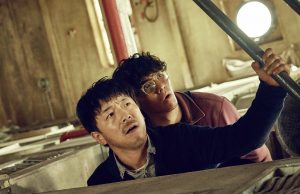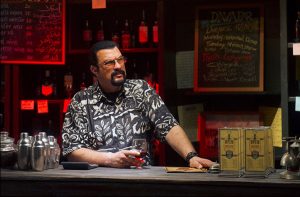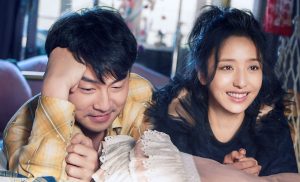Every day while CFI’s Hollywood readers take in the business of the Chinese film industry, the actual movies can sometimes seem exotic or remote. But in major US cities, mainstream Chinese films are increasingly available: thanks to Wanda’s purchase of AMC and distributors like China Lion, they get American theatrical releases practically simultaneous to their premieres at home. Though they receive virtually no publicity outside the non-Chinese community, these films are more than worth seeking out by anyone serious about engaging the Chinese industry, understanding the Chinese sensibility and familiarizing themselves with China’s talent pool. Periodically, CFI will review and point readers in the direction of noteworthy US releases of contemporary commercial and independent Chinese titles.
Chan throws back and rolls ahead
Railroad Tigers (2016), directed by Ding Sheng; Written by Ding Sheng and He Keke.
Distributed by Well Go USA, opens in the US January 6, 2017 (cinemas here).
Grade: B
Quentin Tarantino has long professed admiration for Jackie Chan—in 1995, he presented Chan a Lifetime Achievement Award at the MTV Movie Awards. Twenty years later, in a new, all-but-the-kitchen-sink World-War II-era action-comedy, Chan reciprocates, drawing inspiration from Inglorious Basterds while gleefully mashing together bits and pieces from dozens of other movies in a men-on-a-mission ensemble tale of courage and derring-do.
Like Brad Pitt in Basterds, leading a ragtag coalition of guerrillas against the Nazis in occupied France, Chan gathers a team to take on the occupying Japanese in Shandong province in 1941, at the height of China’s war against invading Japan. When a heroic Communist Eighth Route Army regular dies in Chan’s village en route to blowing up a key railroad bridge on Japan’s supply route, Chan, playing a humble railroad porter, takes it upon himself to organize the theft of the necessary explosives and their subsequent deployment.
Like the steam engine train on which the film mostly travels, Railroad Tigers moves at an unreliable pace, sometimes sluggish, other times madcap—but its best moments recall classic Chan gags and sequences while also spotlighting a confident persona retooled for Chan’s advancing age (he turned 62 last April). Surrounded by a crew played by so-called Little Fresh Meat actors along with his 34-year-old son, Jaycee, Chan winningly reprises the loose-limbed, high-spirited vibe of the Hong Kong Lucky Stars comedies of the ‘80s with charm if not a memorably balletic central performance.
An eager-to-please assembly of mismatched parts, the film additionally recalls in various bits Jerry Bruckheimer uber-productions like National Treasure or early, funny Michael Bay, such as The Rock. There’s a shadow, too, of the galvanizing epic train stunts in Gore Verbinski’s The Lone Ranger. The mix of genres also evokes 2010’s The Good, The Bad and The Weird, the stir-fried South Korean Western from Kim Jee-Woon. And of course we would be remiss not to mention an obvious principal influence, Buster Keaton’s 1925 masterpiece of clockwork railroad mayhem, The General, which Chan often calls his all-time favorite film. Chan has always been superior with train gags and stunts: think of the delightful opening sequence of Drunken Master 2, Chan’s fight with Lau Kar-leung beneath a train car in the same film, or Michelle Yeoh jumping a motorcycle onto a moving train in Police Story 3: Supercop. And the chance here to orchestrate a series of thefts, chases, fights and stunts (including a reprise of Supercop’s motorcycle gag) while chugging along the rails makes for a literal fun-filled ride.
Railroad Tigers is writer-director Ding Sheng’s third feature with Chan, after 2010’s Little Big Soldier and Police Story 2013, and while he has emerged as one of Chan’s most simpatico collaborators and a world-class commercial filmmaker, this latest does not measure up: it comes on underbaked and overstuffed, juggling too many characters while moving the plot on cursory turning points, easygoing when it should be freewheeling, and, though pleasingly cartoonish, lacking the go-for-broke craziness of Stephen Chow or Tarantino’s cruel, unpredictable edge.
Ding’s visuals are slick, including passages of visual poetry, such as an airborne camera skimming across grasses heavy with fluff bending in the breeze alongside a river after Chan visits his mother’s grave, making a promise to avenge her honor. But it’s more compelling when the cutting speeds up, for scenes depicting the process of pieces of their unlikely plan, or when Chan instigates an action setpiece or is about to jump-start a fight sequence with a pole or a pivot and then moves aside. Chan does a clever dance in the more populated action scenes, gently jacklegging or sidestepping the center of the vortex, no longer required to execute the moves he could in decades past. Instead, he is a mellow, even-keeled elder statesman, a compass pointing his men in the proper direction.
Laozai’s often-percussive score, amplifying the syncopation of the locomotives on the tracks, is generally effective; not so much when it gets goofy, such as a Japanese soldier’s ritual suicide accompanied by perky notes (as well as a commander rolling his eyes in exasperation).
The film also provides an example of how to depict Chinese history: it’s no accident that Chan and company are shown aiding Communist Eighth Route Army soldiers and not Chiang Kai-shek’s troops, even though both groups were then fighting against the Japanese.
A clockwork climax, woven with CGI is less than convincing, but the destruction of the train and various Japanese military vehicles, along with the bridge’s detonation are grandly scaled. More than awe, the scene prompts nostalgia for the old-fashioned practical effects, the impetuous challenge to physics itself in Chan movies of old.
An outtakes reel over the end credits includes the gentle dance of our hero suspended on wires above a train, repeatedly forgetting the names of his co-stars’ characters, and best of all, of course, Chan repeatedly cracking up, unable to suppress that glorious smile after all these years, after all these movies.
WHAT DOES THE GRADE MEAN?
Here are some recent & modern-era vintage Chinese and Hong Kong films for comparison
- A+
- PLATFORM (2000, dir Jia Zhangke)
- THE WORLD (2004, dir. Jia Zhangke)
- DRUNKEN MASTER 2 (1994, dir. Lau Kar Leung & Jackie Chan)
- KUNG FU HUSTLE (2004, dir. Stephen Chow)
- A
- LET THE BULLETS FLY (2010, dir Jiang Wen)
- THE MERMAID (2016, dir. Stephen Chow)
- A TOUCH OF SIN (2013, dir. Jia Zhangke)
- STILL LIFE (2006, dir. Jia Zhangke)
- MOUNTAINS MAY DEPART (2015, dir. Jia Zhangke)
- LITTLE BIG SOLDIER (2010, dir. Ding Sheng)
- EXTRAORDINARY MISSION (2017, dir. Alan Mak & Anthony Pun)
- MR SIX (2015, dir. Guan Hu)
- A WORLD WITHOUT THIEVES (2004, dir. Feng Xiaogang)
- SUZHOU RIVER (1999, dir. Lou Ye)
- HOUSE OF FLYING DAGGERS (2004, dir Zhang Yimou)
- RAISE THE RED LANTERN (1991, dir. Zhang Yimou)
- A-
- DUCKWEED (2017, dir. Han Han)
- I BELONGED TO YOU (2016, dir. Zhang Yibai)
- B+
- THE GREAT WALL (2016, dir. Zhang Yimou)
- OLD STONE (2016, dir. Johnny Ma)
- CRAZY STONE (2006, dir. Ning Hao)
- GO, LALA GO (2010, dir. Xu Jinglei)
- B
- KUNG FU YOGA (2017, dir. Stanley Tong)
- RAILROAD TIGERS (2016, dir. Ding Sheng)
- THE WASTED TIMES (2016, dir. Cheng Er)
- CHONGQING HOT POT (2016, dir. Yang Qing)
- MONSTER HUNT (2015, dir. Raman Hui)
- B-
- JOURNEY TO THE WEST: THE DEMONS STRIKE BACK (2017, dir. Tsui Hark)
- SOME LIKE IT HOT (2017, dir. Song Xiaofei & Dong Xu)
- BORN IN CHINA (2016, dir. Lu Chuan)
- D-
- TINY TIMES (2013, dir. Guo Jingming)






